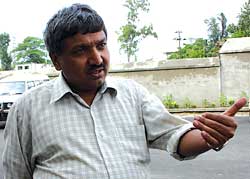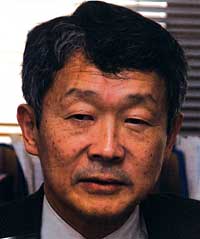 For the donor community which finances nearly three-quarters of the country's development, it is getting more and more difficult to get involved in policy decisions without being seen to be interfering. But when a nation's dependency on the outside becomes so acute, that is a thankless task.
For the donor community which finances nearly three-quarters of the country's development, it is getting more and more difficult to get involved in policy decisions without being seen to be interfering. But when a nation's dependency on the outside becomes so acute, that is a thankless task.
No matter what donors do they will be accused of interference, as the latest controversy over their supposedly overt pushing of a favourite candidate for the post of Rastra Bank governor proves.
For the World Bank which has been backing the financial sector reforms and is the lead agency in the Nepal Development Forum, who becomes the next governor of the central bank is a critical question.
The bank knows, as does just about everyone in Kathmandu, that the search for a new governor is always a highly-charged politicised affair. Aftershocks from appointment four years ago of the incumbent governor, Tilak Rawal, reverberated for months. And like last time, there are accusations that donor agencies are trying to influence the appointment. And because candidates have their political patrons, rivals accuse each other of being unfairly backed by donors.  Until the final hour on Thursday when the cabinet was discussing recommended names for the new governor to succeed Tilak Rawal, fingers pointed at certain donors lobbying for their favourite candidate.
Until the final hour on Thursday when the cabinet was discussing recommended names for the new governor to succeed Tilak Rawal, fingers pointed at certain donors lobbying for their favourite candidate.
Donor agencies have denied any favouritism, insisting that while they follow the appointment keenly they don't want to be seen to have any say in it. But even some non-government officials have cried foul, accusing donors of "extra-terrestrial" interference. Economist Dilli Raj Khanal, adviser to the coalition partner UML, says some donors are openly lobbying for a certain candidate. "They have even been visiting them in delegations," he told us.
Another economist, Bishwamber Pyakurel, says he had heard of this but it is nothing new. "We have known some donors who even recommended names for the position in public, as foreign assistance increases in the country so does the interference," Pyakurel says.
Donor officials told us they just want to make sure the right man gets the post because the Rastra Bank governor plays a key role in the financial sector reforms program. "We have not endorsed any candidate's name," says Sukhwinder Singh, director of International Monetary Fund (IMF) for Nepal. "But we believe that whoever becomes the governor should be able to accelerate the financial sector reforms program and command the respect of the financial and business community."
Who becomes the next governor also matters to the World Bank, IMF, the British aid group, DfID, and the Asian Development Bank (ADB). They are all involved in the financial sector reforms that the central bank coordinates. Under this program, the World Bank has the financial sector restructuring project with four main components: voluntary retirement schemes, hiring of advisers, reengineering of Nepal Rastra Bank and management team support to Nepal Rastra Bank and Nepal Bank Limited.
The financial sector reforms program has the World Bank's $75.5 million assistance. DfID is more involved in the administrative side of things, and ADB is involved in the rural financing.
Among donors, the World Bank has the leading role and at the centre of the governor appointment controversy is its outspoken Nepal country director, Ken Ohashi. Critics have accused him of pushing the chief secretary Bimal Koirala as candidate. "We know that he has even been visiting Koirala's office for that purpose and then tried to cover his tracks," economist Khanal told us.
A source at the National Planning Commission confirmed Ohashi had met him after visiting Koirala. "He was trying to explain that he was not actually pushing for Koirala."
 Ken Ohashi denies lobbying for any candidate, "The process of appointing the central bank governor is clearly laid down in the new Central Bank Act. It is designed to ensure the selection is not made on the basis of political pressure or for that matter donor preferences and we respect that."
Ken Ohashi denies lobbying for any candidate, "The process of appointing the central bank governor is clearly laid down in the new Central Bank Act. It is designed to ensure the selection is not made on the basis of political pressure or for that matter donor preferences and we respect that."
Donors say the government sometimes dangles a few names to seek donor reaction, but doesn't ask for recommendations. "Government officials and policy makers ask us general questions regarding our view on the appointment," the IMF's Singh says. Ohashi shares his viewpoint. "We do provide advice when sought, we consider this very much a part of our development mandate in your country. At the end of the day, it is up to the authorities to take or leave our advice."
Deputy Prime Minister and Finance Minister Bharat Mohan Adhikari says the government is following its procedures for the appointment. A three-member committee was formed through cabinet decision to recommend three candidates for the position. The rule allows the government to choose one of the three recommended names.
Adhikari denies that the government goes around asking donors for the green light. "We never ask them for suggestions," he told us. "We will make the appointment within the stipulated time ourselves."


